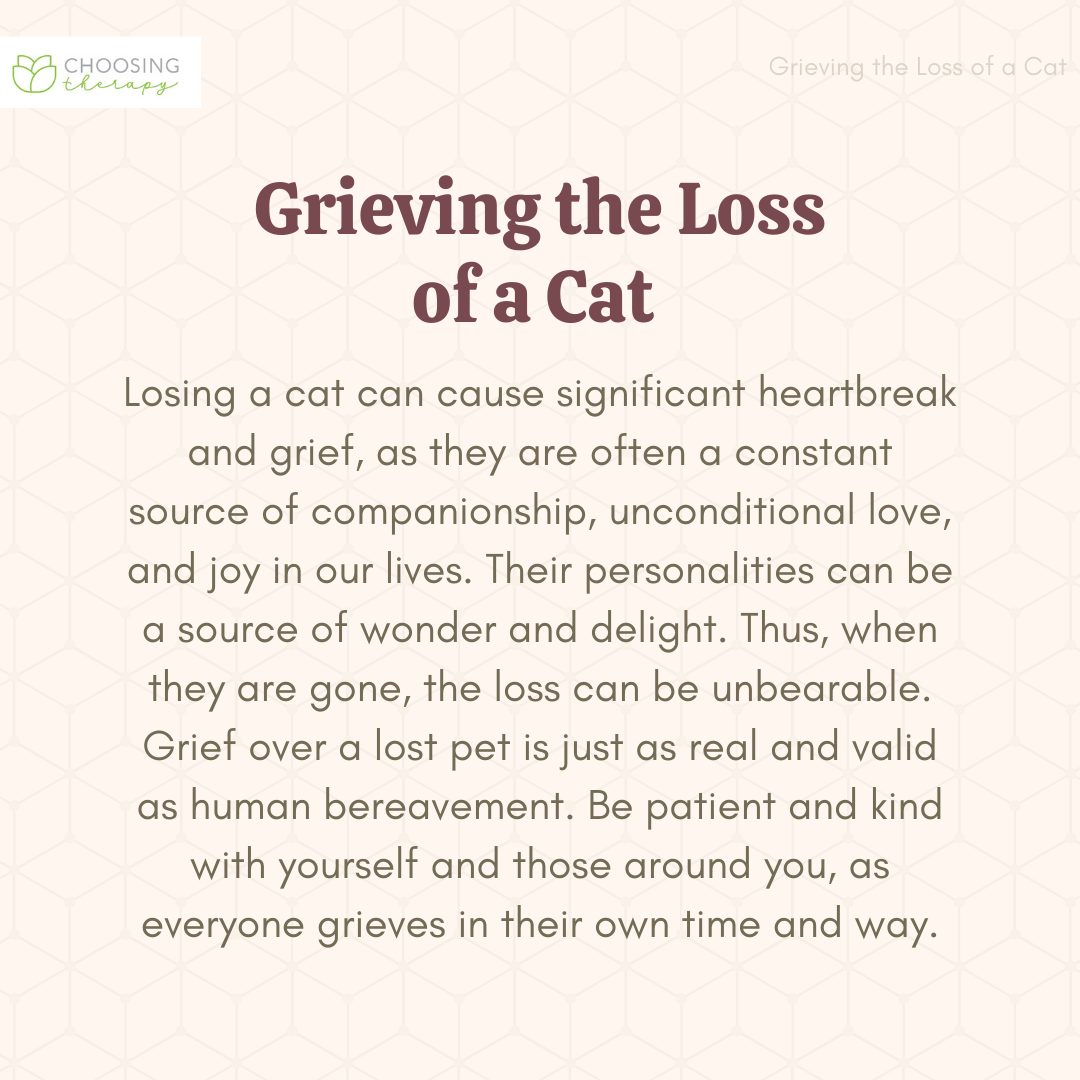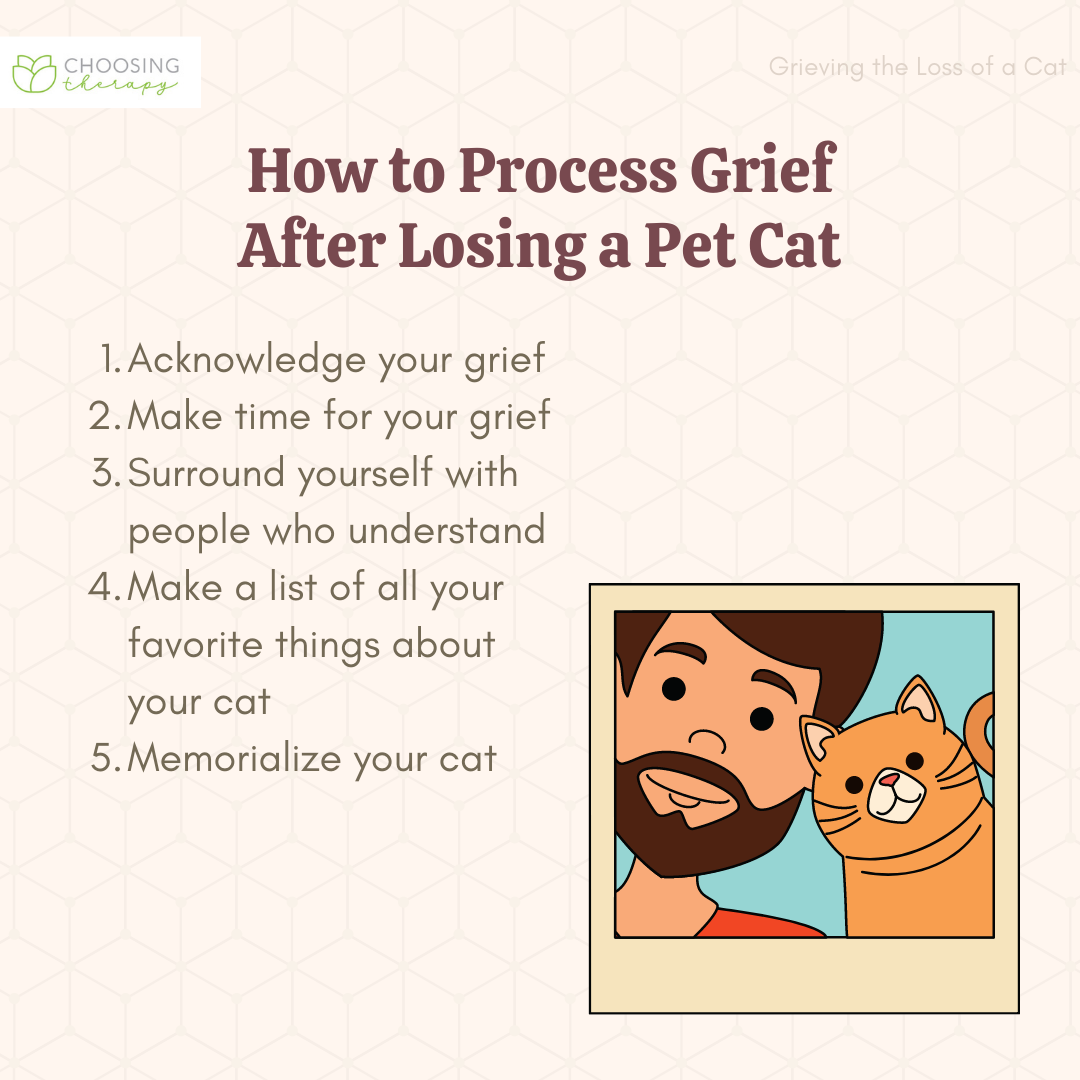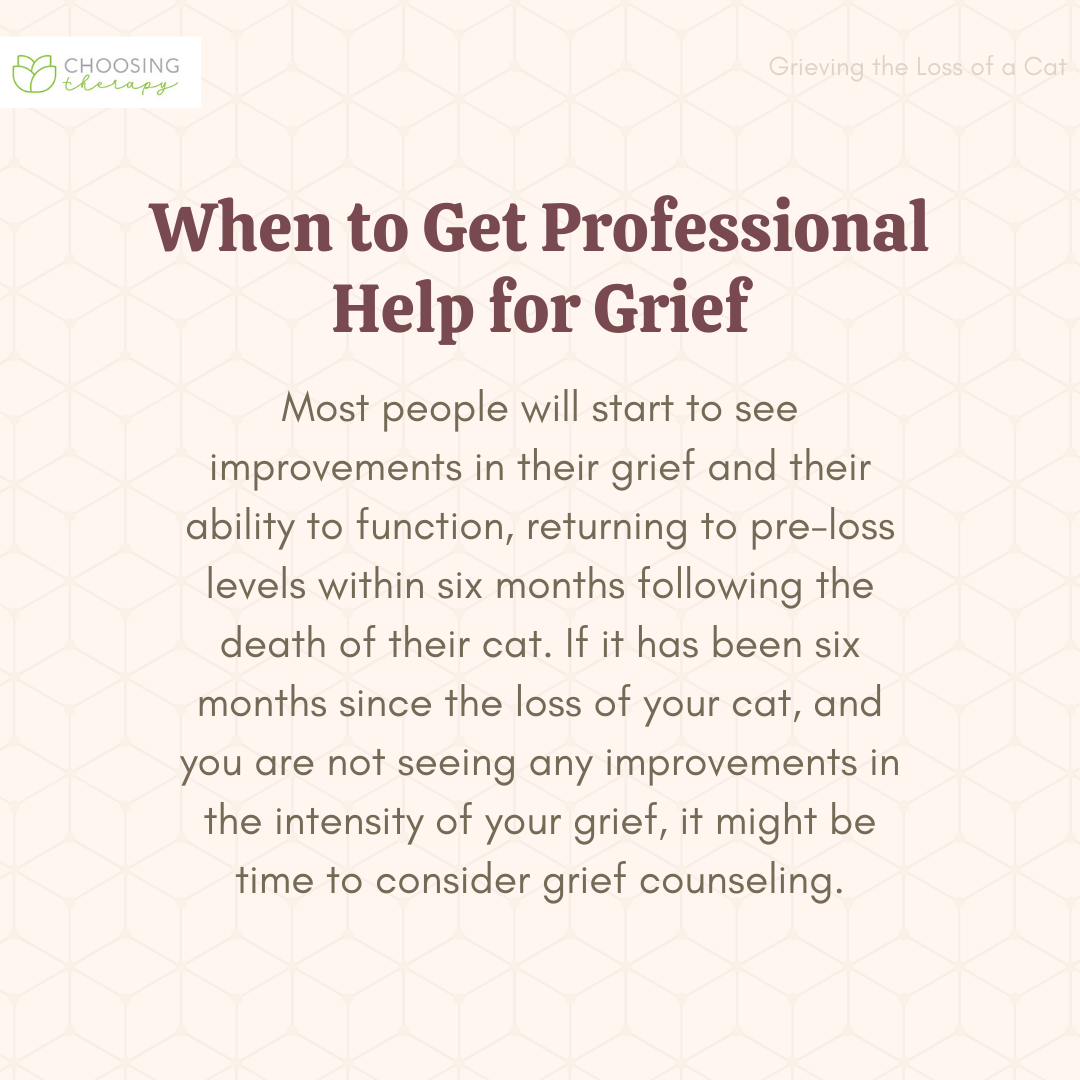The loss of your pet cat can feel devastating. The initial grief often feels like a tidal wave, as you struggle with sadness, a sense of loss, or shock over your pet’s death. Grief is a normal response to significant losses. It can take time to work through grief as you adjust to living without your cat companion.
Would you like to talk about your loss?
Therapists are patient and good listeners. BetterHelp has over 20,000 licensed therapists who provide convenient and affordable online therapy. BetterHelp starts at $65 per week. Take a Free Online Assessment and get matched with the right therapist for you.
Your Grief Over Losing a Cat Is Valid
Losing a pet can cause significant heartbreak and grief, as they are often a constant source of companionship, unconditional love, and joy in our lives. Their personalities can be a source of wonder and delight. Thus, when they are gone, the loss can be unbearable. Grief over a lost cat is just as real and valid as human bereavement. Be patient and kind with yourself and those around you, as everyone grieves in their own time and way.
Understanding Grief After the Loss of a Cat
There is no right or wrong way to mourn the loss of your cat. Normal grief is not a disorder. It is a natural process that your body and mind know how to move through. Contrary to popular belief, grieving doesn’t have to follow specific stages, and each person grieves in their unique timeline through the pet loss stages of grief.1,2,3,4
Emotions May Come in Waves
The experience of grief is sometimes linked to waves of emotion.5 In the beginning, those waves might seem so high and close together that they “knock you off your feet.” Initially, you might find your grief debilitating, finding it difficult to function in one or more areas of your life. That being said, we can still experience moments of joy, hope, and peace interspersed among the moments of sadness.6,7
If Your Grief Remains Intense, Seek Help
For 80% of people, grief will resolve within six months post-loss, although it might spike as relevant anniversaries (like their death anniversary) or other trigger reminders of your cat occur.8 If there is no improvement within six months, you might be experiencing prolonged grief disorder or complicated grief. In this case, it is advisable to reach out to a professional counselor for help.8
Feeling Guilty Is a Natural Response
The loss of your cat might also bring feelings of guilt. Guilt can occur if it is a sudden and unexpected death due to illness or injury. You might be left wondering if there was something you should have done differently to prevent the death of your cat. Or, if you had to make the difficult decision to put your cat down, this might also elicit feelings of guilt. Guilt can be a natural part of the grieving process that we all need to work through.
It is essential to keep in mind that judging yourself based on hindsight is not a fair or reasonable perspective. By doing so, you can unnecessarily intensify feelings of guilt and therefore grief. Know that you made the best decisions regarding your cat with the information you had or didn’t have at the time. There is nothing we can do to change the past, but acceptance and compassion can go a long way to helping to release guilt.
Help For Grief & Loss
Talk Therapy – Get personalized help in dealing with a loss from a licensed professional. BetterHelp offers online sessions by video or text. Free Assessment
Ketamine Program For Depression, Anxiety, and Trauma – Nue.life offers an at-home, evidence-based ketamine program supported by hundreds of clinical studies. Our clients feel rapid & lasting relief within hours after the first treatment. Learn More
How to Process Grief After Losing a Cat
Each person grieves in their own unique time and way. There are no time limits or “shoulds” regarding grief. At the same time, here are a few ideas you might find helpful in supporting you as you deal with losing your pet cat.
Here are five steps to help yourself process your grief after the loss of a cat:
1. Acknowledge Your Grief
Acknowledging your grief over your cat’s loss will help you move through the suffering rather than avoiding your feelings or getting “stuck” in it. You have lost a significant and beloved presence in your life. Treat yourself with patience, kindness, and compassion, recognizing that your grief might cause you to be more tired, forgetful, teary, or easily overwhelmed. These things are okay! They are common grief responses, which will go away or become easier to manage with time.
2. Set Aside Specific Time for Your Grief
If your grief is taking over your day and interfering with your ability to function, a strategy that some people find helpful is to schedule your grief. Set aside 15-30 minutes daily to grieve, and use a timer to limit how long you spend. Give yourself the privacy you need to be with your grief during that time. When the alarm goes off, immediately get up, wash your face, drink water, and return to your life. If your grief pokes into your day at other times, shut it down. Tell your grief that this is not the time, and it must wait until you have the scheduled time. This focused mindfulness can be a helpful way to both honor your grief and contain it from spreading and interfering with your ability to function.
3. Surround Yourself With People Who Understand
Not everyone will understand the depths of your grief from losing your cat, but there will likely be some who will. These people have seen you spend time with your cat and may have also experienced the same love you had for your furry friend. You will want to be around them frequently so that their empathy and understanding can give you a safe environment to talk. They may also have better insight into approaching challenges and adjusting to living without them.
There may even be online support groups for others like you who are struggling with grief over their cat’s death.
4. Make a List of All Your Favorite Things About Your Cat
Some people might find it helpful to reflect upon the many things they loved about their cat as part of the grieving process. You might want to list your favorite characteristics and stories about them as a way to remember them and appreciate all the goodness they brought to your life. You can keep these as a reference to return to when you are missing your cat, potentially putting your mind at ease by not needing to constantly spend the energy to preserve your cat’s memory.
5. Memorialize Your Cat
Some will choose to memorialize their cat more formally. Ways to do this might include:
- Having a plaster impression made of your cat’s paw
- Creating a memory box to store pictures of them, their collar, or favorite toys
- Creating a collage of pictures of your cat from different life stages
- Installing a memorial garden stone
- Planting a tree in their memory
Healing from a loss can take many years.
You don’t have to deal with grief on your own. BetterHelp has over 20,000 licensed therapists who provide convenient and affordable online therapy. BetterHelp starts at $65 per week. Take a Free Online Assessment and get matched with the right therapist for you.
When to Get Professional Help for Grief
Most people will start to see improvements in their grief and their ability to function, returning to pre-loss levels within six months following the death of their cat. If it has been six months since the loss of your cat, and you are not seeing any improvements in the intensity of your grief, it might be time to consider grief counseling.8 If you continue to ask yourself, “do I need therapy?” it may be helpful to explore an online therapist directory to find the right therapist that can help you process the grief of losing your cat.
Helping Children Grieve Losing of a Cat
The loss of a pet might be the first time a child faces death and the grief accompanying it. Properly explaining death to a child can help them to understand the loss of their cat in an age-appropriate way that isn’t damaging to their development. Use clear and direct language about death, letting them know that their cat is dead, which means it is no longer alive and can’t be with them.
Promoting a healthy response to death and grief for children involves providing support and validation of their suffering and providing role modeling that it is okay and normal to cry when we lose someone we love.
Should You Get a New Cat to “Replace” a Lost One?
While a new cat can’t “replace” the unique and special relationship you had with the cat you lost, it might be able to fill an essential role in your life as your “animal companion.” There are no standard answers to how long you should wait before adopting another cat. The decision to get another pet is a deeply personal and individual one, and only you and your family can understand what timeline would be best.
Some people will feel they need time to deal with their heartbreak and grief before opening up their hearts and home again to another cat. Others will decide to adopt a new cat soon after the loss so that they can continue to have an animal companion in their life and even help cope with their grief. Still, some might decide that they no longer want pets going forward to avoid having the same experience of loss again. Your decision has to make sense for you and your life situation.
Final Thoughts
Losing your pet cat can be a heartbreaking and devastating experience. Grief is a normal response to a significant loss in our lives. Pets can play an essential role in our lives – providing companionship, unconditional love, joy, and humor. Losing them can leave a big hole not only in our daily lives but also in our hearts. Allow yourself the time and space to grieve. Your grief is real and deserves to be honored. If, after six months, you are not noticing improvements in your grief, seek out the help of a grief counselor.
Additional Resources
To help our readers take the next step in their mental health journey, Choosing Therapy has partnered with leaders in mental health and wellness. Choosing Therapy is compensated for marketing by the companies included below.
Online Therapy
BetterHelp Get support and guidance from a licensed therapist. BetterHelp has over 20,000 therapists who provide convenient and affordable online therapy. Take A Free Online Assessment and get matched with the right therapist for you. Free Assessment
Ketamine Program For Depression, Anxiety, and Trauma
Nue.life offers an at-home, evidence-based ketamine program supported by hundreds of clinical studies. Our clients feel rapid & lasting relief within hours after the first treatment. Learn More
Grief And Loss Newsletter
A free newsletter from Choosing Therapy for those impacted by the loss of a loved one. Get encouragement, helpful tips, and the latest information. Sign Up
Best Online Therapy Services There are a number of factors to consider when trying to determine which online therapy platform is going to be the best fit for you. It’s important to be mindful of what each platform costs, the services they provide you with, their providers’ training and level of expertise, and several other important criteria.
Best Online Psychiatry Services Online psychiatry, sometimes called telepsychiatry, platforms offer medication management by phone, video, or secure messaging for a variety of mental health conditions. In some cases, online psychiatry may be more affordable than seeing an in-person provider. Mental health treatment has expanded to include many online psychiatry and therapy services. With so many choices, it can feel overwhelming to find the one that is right for you.








